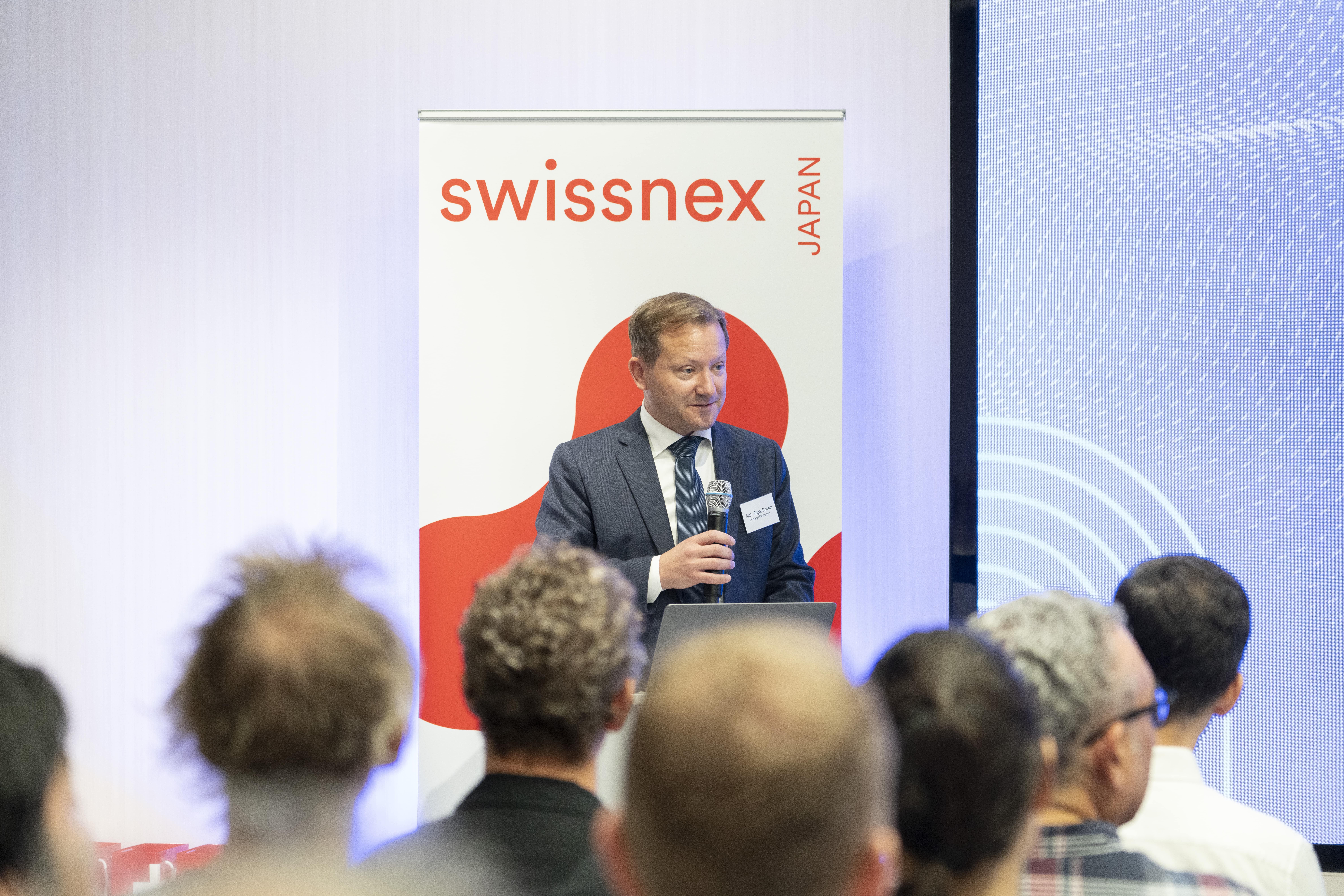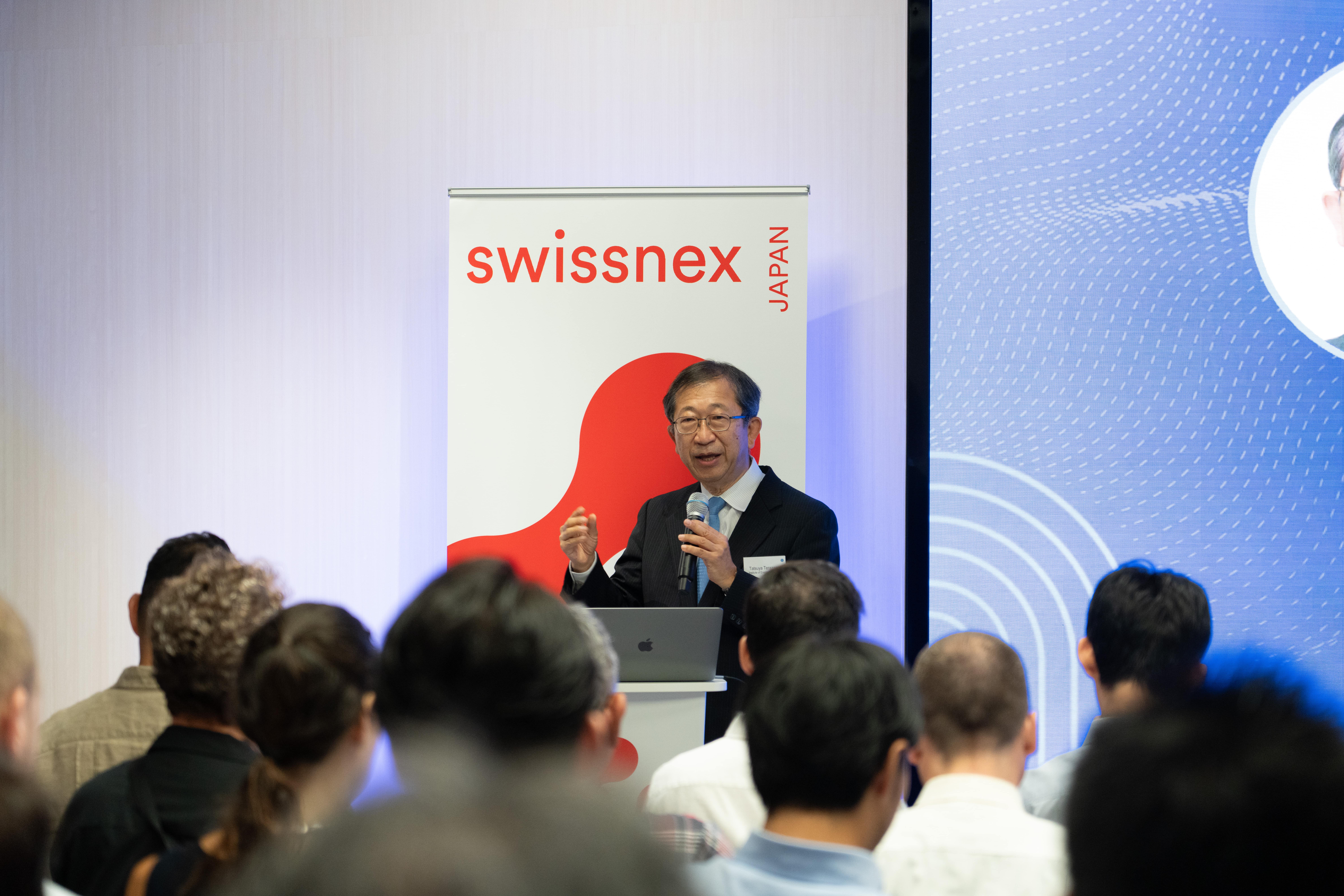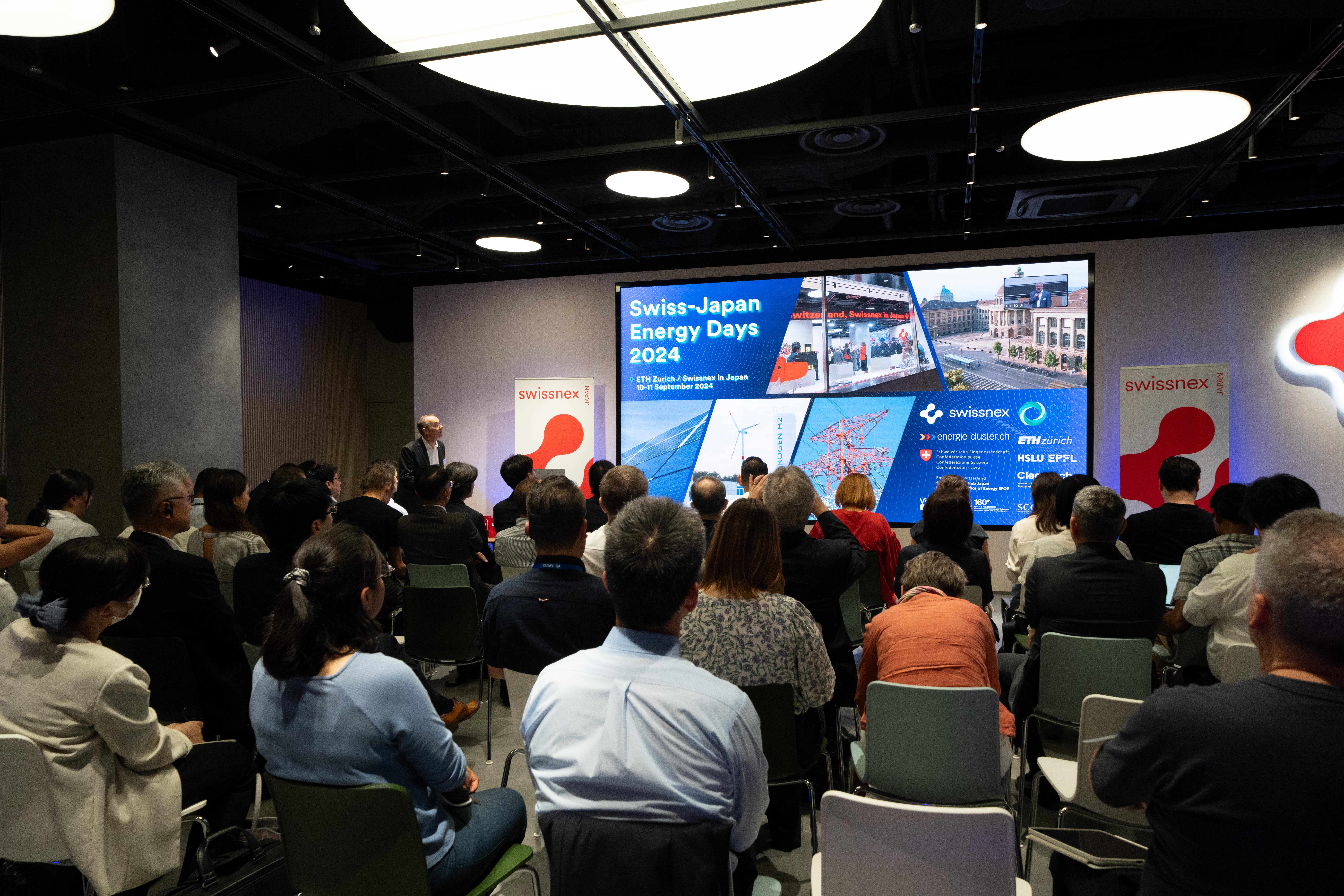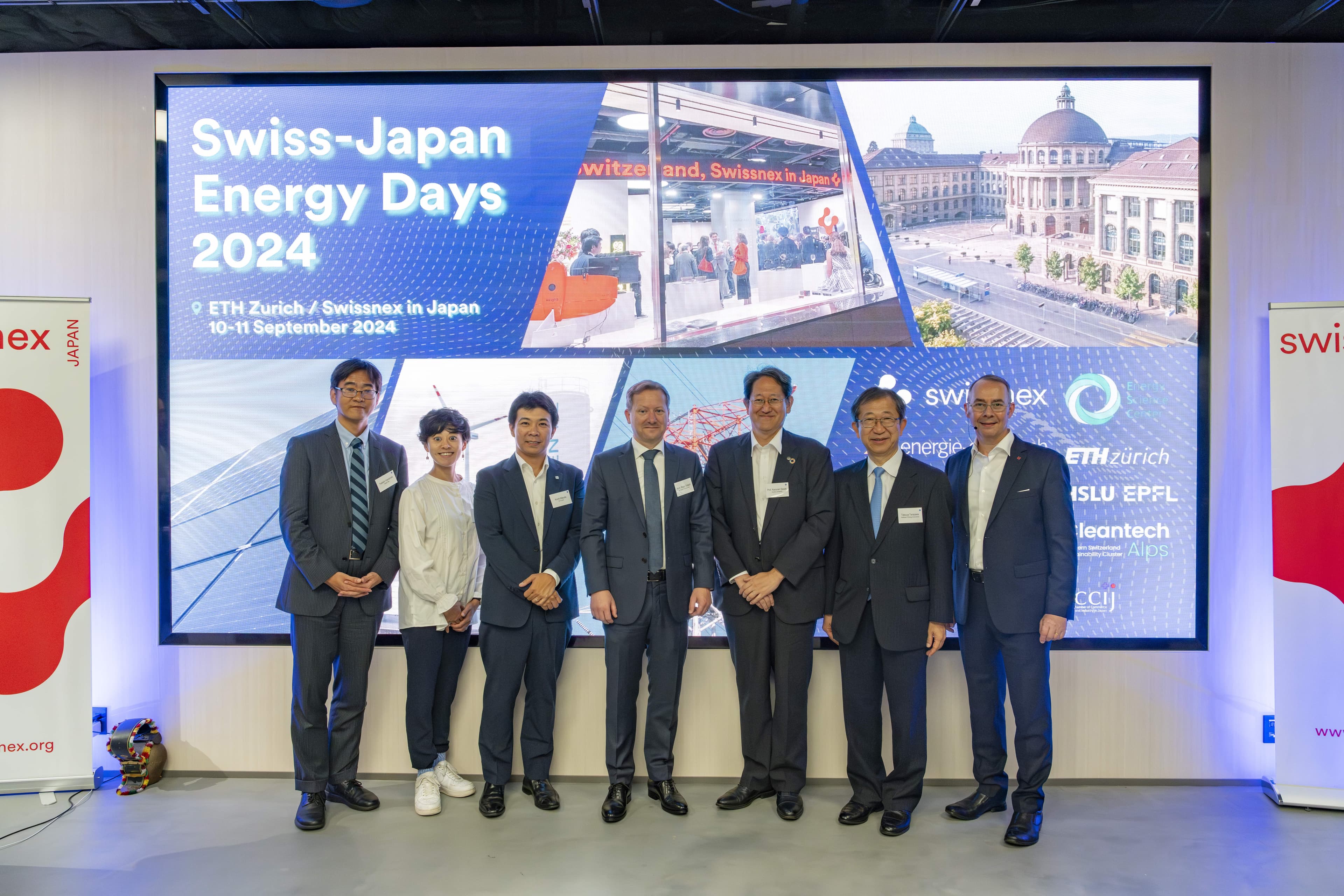In an era of pressing climate concerns and energy security challenges, two innovative nations are aiming to develop new solutions through collaboration. The inaugural Swiss-Japan Energy Days, held in early September 2024, brought together leaders from government, academia, and business to explore collaborative solutions for a sustainable energy future.
This groundbreaking event signals a new chapter in international cooperation on clean energy, leveraging the unique strengths of both countries. HORIZON was on the ground at Swissnex in Japan to capture the insights from this landmark gathering.
Venues for Innovation
The event took place simultaenously at Swissnex in Japan, located within Consulate of Switzerland in Osaka, and ETH Zurich. Dr. Felix Moesner, the CEO of Swissnex in Japan, began the day by describing what makes the organization so unique. Swissnex in Japan is Switzerland’s “first Science consulate,” representing a new vision that “prioritizes sustainability in diplomacy.” This innovative space thus provided an fitting backdrop for the two-day conference. Each of the days was held under a different theme, with day 1 focusing on “Market Developments and Renewables” and including numerous speeches centered on energy policy—the primary focus of this article.

Switzerland and Japan: Shared Challenges, Common Goals
Roger Dubach, the newly appointed Ambassador-Designate, focused his keynote speech by addressing a key question: Why Switzerland and Japan? Despite their geographical distance, Dubach highlighted striking similarities that make this partnership particularly promising:
· Highly developed economies with limited natural resources
· Democratic governments
· Commitment to net-zero emissions by 2050
· Shared geopolitical concerns, including energy security, in light of the Ukraine conflict and tensions around Taiwan
These commonalities set the stage to nourish potentially transformative collaborations in energy policy and innovation.

Switzerland's Energy Security Pivot
Next was Benoît Revaz, the director of the Swiss Federal Office of Energy, who shed light on Switzerland's evolving approach to energy policy. Russia’s invasion of Ukraine catalyzed a significant shift, resulting in the “Federal Law of Supply Security With Renewable Energies,” which ties the expansion of renewable energy directly to energy security instead of climate change—perhaps making it more politically palatable in the process. While this law codified Switzerland’s commitment to renewables, implementing its goals has not come without challenges.
Revaz emphasized the permitting of projects as the biggest challenge facing the country currently, as building lake reservoirs, onshore wind powerplants or photovoltaic power stations is time intesive and loosening the regulatory environment a key bottleneck. He then stroke another interesting comparison with the case of Japan: “While Switzerland is not an island like Japan, it is from an institutional perspective, as the country is not sufficiently integrated with the EU electricity market and surrounding regulations.” To truly achieve both energy security and the country’s climate commitments, Revaz underscored the need for internal regulatory reforms paired with pan-European institutional convergence.
Japan's Unique Challenges and Innovative Solutions
Tatsuya Terazawa, Chairman and CEO of the Institute of Energy Economics Japan, offered a candid assessment of Japan's energy landscape. He began by underscoring Japan’s official goals, with include a 46% reduction in greenhouse gas emissions by 2030 when compared to 2013, in addition to the 2050 net zero target. Terazawa continued by outlining some of the issues with developing renewables in Japan. First, the country is 70% mountainous, making massive installation of solar problems difficult in many parts of the country. Second, there is strong local opposition to onshore wind power development, while offshore wind power is difficult to realize due to the depth of the sea when compared to the North Sea in Europe. Furthermore, the nuclear question is still open: Following the Great East Japan Earthquake in 2011 and the resulting accident at a nuclear power plant in Fukushima, nuclear power—which accounted for 50% of the Japan’s energy mix at the time—has been dramatically reduced, with 21 plants sitting idle today.
Terazawa then struck a more hopeful note, outlining the strategies Japan is pursuing given these challenges. He mentioned a whole array of policy solutions, ranging from initiatives that realize renewable capacity production alongside local communities, extending the lifetime of the newest and safest nuclear reactors, geothermal power, hydrogen ammonia as well as carbon capture.

Both Terazawa and other speakers highlighted key areas where Switzerland and Japan can combine their strengths:
· Strong scientific and technological sectors
· Robust financial industries capable of funding innovation
These assets position the two countries to drive breakthroughs in critical areas like hydrogen and carbon capture technologies.
Perhaps most importantly, numerous speakers emphasized that the impact of Swiss-Japanese collaboration must extend beyond their borders. While leveraging the countries common strengths to develop solutions to shared problems will be essential moving forward, extending these solutions beyond Japan and Switzerland is even more so, as this is where the two countries can truly become leaders in the energy transition. This extends beyond research and development. Both countries also have the financial capacity to fund projects on a global scale, and especially in developing countries.
From Forum to Action
The Swiss-Japan Energy Days provided the first forum for two countries that have more in common than one might assume when it comes to energy policy. Aside from the policy keynotes discussed in this article, the event also featured numerous start-up pitches, underscoring the technological potential for collaboration between Japan and Switzerland. Featuring somber assessments, intense policy discussions, academic analysis, as well as potential solutions from the field of business, the Energy Days thus delivered on its ambitious agenda.
HORIZON will continue to follow developments from this promising partnership, eager to see how the seeds planted at the Swiss-Japan Energy Days will grow into concrete solutions for our shared energy challenges.






